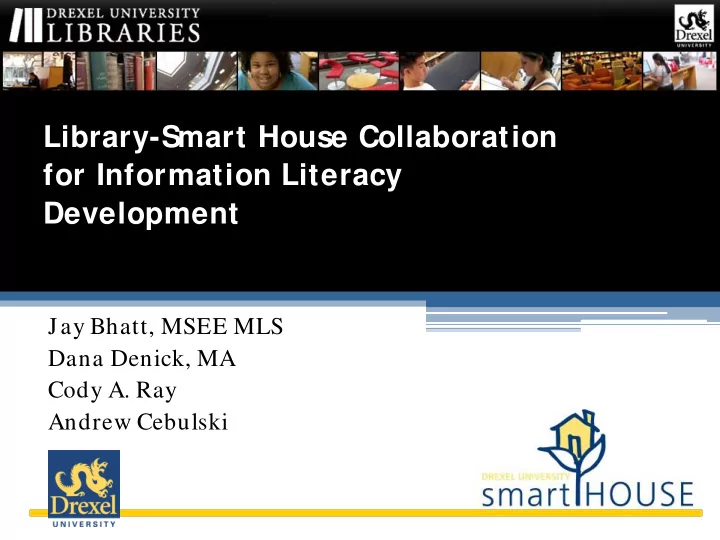

Library-Smart House Collaboration for Information Literacy Development Jay Bhatt, MSEE MLS Dana Denick, MA Cody A. Ray Andrew Cebulski
Drexel University www.drexel.edu • Founded in 1891, University is known for its strengths in engineering, science and technology • The College of Engineering is the third largest private engineering college in the country. • Total Drexel Student Population (approx.): 12,000 undergraduates; 1000 graduate students; 4000 professional/ other. • Engineering Student Population (approx.): 2800 undergraduates; 900 graduate students (550 master's; 350 doctoral)
Drexel University Libraries www.library.drexel.edu • All Drexel Libraries: ▫ Electronic Databases: 559 ▫ Electronic Books: 121,668 ▫ Electronic Journals: 27,224 ▫ As of June 3, 2009 • The mission of the Drexel University Libraries is to support the University’s academic programs, research initiatives, and student learning. Source: Print is Dead, DU Libraries Eresources blog: http:/ / w w w .library.drexel.edu/ blogs/ eresources/ 2009/ 06/ 04/ e-resource-roundup-8/
Drexel S mart House www.drexelsmarthouse.com • Student-led organization founded in 2006 • multidisciplinary project to renovate an urban home to serve as a “living laboratory” for exploring cutting edge design and technology. • Research Areas: ▫ Environment, Energy, Interaction, Health, Lifestyle • Ultimate goal of improving quality of life in the urban residential setting.
Library-S mart House Collaboration • The Library-Smart House collaboration seeks to go beyond the constraints of a single course and provide similar resources and information literacy instruction through collaboration with an ongoing student project. • Previous Library-Smart House interactions included blog postings, information literacy instruction and design group consultations.
Interdisciplinary Collaboration • “Increasingly, the most significant new scientific and engineering advances are formed to cut across several disciplines.” * • Smart House participants include students from engineering disciplines, architecture, business, media arts & design, and interior design • Smart House operates as an incubator for student developed designs and technologies. We have the same diverse needs as any “real” business. Source: National Research Council. 2005. Rising above the gathering storm: Energizing and employing America for a brighter economic future. Washington, DC: National Academies Press.
Virtual Collaboration • Engineering students must gain experience with a wide variety of virtual communication and research tools in order to meet the demands of an increasingly global workplace. • Bringing together students and faculty from different disciplines to collaborate more effectively in a unified work environment
Collaboration Model • Drexel Smart House ▫ Organizational Structure and Processes ▫ Virtual Education and Work Environment ▫ Curriculum Integration • Project Management and Data Collection/ Storage for Continuity • Stakeholder Relationship Management • Document Collaboration and Storage • Mashable databases and APIs
Web-Based Collaborative Tools • Smart House Wiki –
Information Awareness • When students are faced with open-ended Smart House problems, students need formalized instruction and extensive coverage of the research process. * • Obvious need for increased information awareness of new technologies, resources and tools for students • For any successful Information Literacy program, student awareness of existing and potential information resources is absolutely critical. Source: Hannon, C., M. Huber, and L. Burnell. 2005. Research to Classroom: Experiences from a Multi-institutional Course in Smart Home Technologies. SIGCSE Bulletin 37(1):121-125.
Information Awareness • Students need increased visibility of available resources and multiple methods of communication and marketing. • Traditional means of supporting information awareness will be implemented, such as specialized research guides and library presence in course management systems. • Use of Web 2.0 tools such as blogs, RSS feeds, wiki, and social networking tools such as Facebook and LinkedIn will be explored.
Blog Entry
S pecialized Research Guides • Engineering and Building Standards • Interdisciplinary Research Areas • How to Apply for a Patent
Meeting Virtual Information Needs • Embedded Library Tools ▫ Virtual Reference Email, IM allows for point of need communication. ▫ Library Catalog Widget • Library Presence in Student Workspace ▫ Smart House Wiki ▫ Facebook
Freshman Design Instruction • Interactive, Web-based Tutorials ▫ Types of Resources ▫ Using Resources • Small Class Setting Instruction ▫ Problem-Based, Active Learning ▫ Questioning with Incentives • Assessment ▫ Knowledge Recall, Synthesis of Skills ▫ Web-based, Timed
Informal Assessment • Smart House Meetings ▫ Perceived value of library involvement ▫ Ideas for future implementation • Group Consultations ▫ Observation, dialogue and interaction involving information seeking experiences ▫ Assessing information needs ▫ Student feedback regarding resources and usability – Exit interview ▫ Anecdotal record of group research progress
Formal Assessment • Online survey to assess students’ awareness of different tools and technologies ▫ Frequency of library resource use • Information Literacy Instruction ▫ Questionnaire to seek understanding of specific information literacy competencies. ▫ Student Final Project and Bibliography Evaluation (Citation style, Quality, and quantity, faculty response)
Assessment Question Examples
Expected Outcomes • Collaborative Model ▫ Detailed archive of each project and research endeavor in Smart House Wiki. ▫ Continuity of Smart House initiatives and communication ▫ Basis for future Library collaborations • Successful Student Projects ▫ On campus and regional design competitions - Some projects receive awards through organizations such as EPA. ▫ Drexel Smart House being recognized by the Office of Campus Activities as an Outstanding Student Organization ▫ Presentation and publication of findings - Projects and papers from the Drexel Smart House be accepted in the National Science Digital Library ▫ Apply and receive funding from NSF and other funding agencies.
Recommend
More recommend